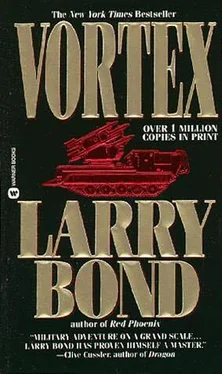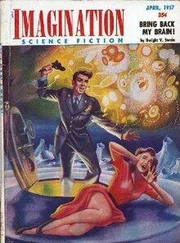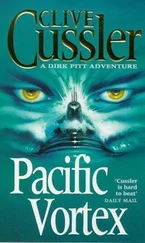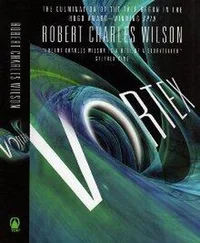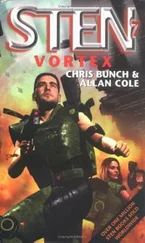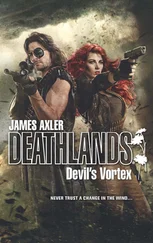“Rob, we’re done! Now I suggest we get the hell out of here! “
O’Connell turned toward the hoarse shout. Lt. Col. Mike Carrerra pointed toward a collection of empty trucks. The wounded they’d carried were all inside the C-14 1. O’Connell nodded vigorously.
“Amen to that, Mike. Get your people aboard! “
“Right.” Carreffa whirled round and yelled through cupped hands, “Let’s go, Alpha Two!”
Moving fire team by fire team, the Rangers of the 2/75this
Alpha Company scrambled upright and ran for the open cargo bay. As the last man’s combat boots thudded onto the steel ramp, Carrerra signaled the
Air Force crew chief waiting eagerly by the door controls.
“Close and seal!”
He turned back to O’Connell with a wide, punch-drunk grin plastered across his face.
“Well, I’ll be dipped in shit, Colonel. I gotta admit
I never thought we’d pull this fucking thing off. Congratulations. “
O’Connell smiled wanly and glanced over his shoulder at the rest of the
C-141’s crowded cargo bay. Dozens of men lay motionless on either side of the central aisle, swathed in bloodstained bandages. Others, apparently uninjured, sat silently along the Starlifter’s metal walls, clutching M16s and light machine guns in hands that shook uncontrollably.
Carrerra’s battalion had taken heavy losses while seizing and holding the
South African airfield. His own unit’s casualties were even higher.
Preliminary casualty reports showed the ln5this losses running at more than 50 percent. His Ranger battalion had been wrecked while accomplishing its mission.
He looked up at Carrerra’s tired face.
“Yeah. We did it. I just hope to
God it was worth the price.”
Carreffa eyed the pillars of smoke and flame rising in a great arc from the west to the north.
“Well, one thing’s for goddamned certain. These bastards will sure as hell know we’ve been here!”
O’Connell found himself nodding in agreement as the cargo ramp whined shut, blocking their view of South Africa. The huge C-141 was already in motion, turning rapidly onto the runway leading home.
Karl Vorster’s government had just lost its nuclear option.
DECEMBER 7-SIMONS TOWN NAVAL BASE, CAPE TOWN
“There’s the helicopter. ” Brig. Chris Taylor, commander of the
Independent Cape Province Defense Forces, pointed out over the water. At first, the shape was visible more by the starlight it blocked than as a concrete form-visible just as a small patch of blackness racing low across white-capped water. But the whupping sound of rotor blades made it real.
The helicopter was headed for a pier at the Simonstown Naval Base, an area controlled by his troops, but still in range of the guns on Table
Mountain. In fact, all of Cape Town was in range of those guns, and that was a problem. Vorster’s troops, holed up in the mountain, had made the liberation of Cape Town a hollow victory, because any movement, any sign of organized activity, quickly ended in a storm of shellfire.
For more than three weeks, the whole city had taken a terrible beating.
Its citizens now moved only at night, without lights, and as much as possible, without noise. All those who
“a could had fled to the countryside-something that wasn’t an option for Cape
Town’s black population.
The black and colored population lived in Alexandra township, south of the city, and they depended on the normal commerce of the city for their income. Servants, cleaners, and laborers, they’d been hit the hardest when the daytime shelling started.
Now bands of blacks roved the city, looking for food, money, or anything of value. Transportation was rigidly controlled, and Taylor’s forces were once more employed in trying to preserve order. Those that weren’t busy chasing looters escorted food convoys or formed ai perimeter around Table
Mountain-guarding against a sortie by the besieged forces.
Vorster’s troops were deeply entrenched in a network of improved caves and tunnels bored into solid rock. With little more than a single infantry battalion plus artillery, they’d stood off two determined attacks by Taylor’s much larger forces. Those assaults had claimed so many of his men that he’d given up trying to take the place by storm.
Unfortunately, a conventional siege was certain to be both costly and protracted. He wasn’t completely familiar with the defenses, but it was common knowledge in the Army that the mountain held food and ammunition for several months. Ammunition in abundance, including plenty of shells for their heavy G-5 howitzers. The G-5s, massive 155mm artillery pieces with a forty-kilometer range, were the centerpiece of the holdouts’ defenses.
Well, he thought, with luck and some tact, they could end the siege with
American help. Taylor, his secondin command, Adriaan Spier, and Deputy
Governor Fraser were all going out to meet the American invasion fleet steaming toward the Cape Town coast.
Making sure that his hooded light was pointed out to sea, one of the soldiers escorting Taylor’s party shone a beam toward the advancing aircraft. As if making sure that was the proper recognition signal, the helicopter paused about fifty meters away, hovering over the water.
Phosphorescent foam showed where its powerful rotor wash hit the surface.
It
waited, hanging almost motionless in the air, until the South African signalman pointed his light at a clear section of the pier. Then the aircraft slid forward and came in to land.
The concrete pier was ten meters wide at this point. In earlier days,
Simonstown had served as a base for the Dutch, then the Royal Navy. Now it served what was left of the South African Navy-a force that had shrunk from scores of ships to the present handful of missile boats. Some of those had been lost in the fighting. The rest were hidden along the coast against future need. They would be of little help in assaulting the
Mountain.
As soon as the helicopter settled, Taylor shook a few hands, received heartfelt best wishes from his men, and trotted toward the aircraft, ducking under the still-turning blades. Spier and Fraser were close on his heels, and as they approached, a side door opened, revealing a red-lit interior.
The three men quickly clambered aboard, helped by experienced hands.
Crewmen, expressionless beneath bulky flight helmets, strapped them in.
As soon as they were secure, Taylor felt a steady pressure on his seat and spine. They were airborne.
Just as the helicopter started moving forward, a flash and the roar of an explosion broke the night’s calm. Taylor felt the machine shudder.
Spier, seated beside him, said, “It’s a ranging shot. They must have seen something. “
True. The smallest flicker of movement could attract the attention of the guns hidden in Table Mountain’s tunnels. Even sound could prompt an attack.
A second shell landed closer to the pier than the first. White water spouted high in the air. Taylor swore softly. Even a near miss could tumble the slow-moving helicopter into the ocean.
He felt the helicopter’s engines roar as the pilot fire-walled the throttle. It skimmed over the water, gathering speed. A third round landed almost on top of their landing site, but they were well away, and
Taylor was sure that the men they’d left behind were long gone. You didn’t live long in Cape Town these days without knowing how to take cover.
The helicopter was a troop carrier, a Nighthawk version of the Sikorsky UH-60, equipped with navigation and nightvision gear.
Taylor and the other two rubbernecked for a few moments until an enlisted man handed’ each South African an intercom headset. Removing his beret,
Читать дальше
